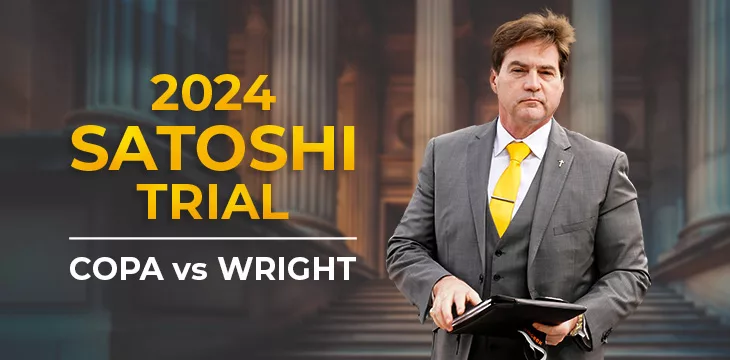|
Getting your Trinity Audio player ready...
|
The COPA v Wright trial began in earnest Monday, as both sides gave their opening arguments to a packed London court where the battle over the identity of Bitcoin’s inventor—and the future of the entire digital asset industry—will be decided.
COPA, otherwise known as the Crypto Open Patent Alliance, is led by a powerful cabal of commercial interests such as Coinbase (NASDAQ: COIN), Kraken, Block, and (until an eleventh hour retreat in the week before trial) Meta (NASDAQ: META). They sued Dr. Craig Wright, a British Australian computer scientist, in the hopes that a court will determine—and declare—that Wright is not Satoshi Nakamoto, the pseudonymous inventor of Bitcoin.
Both sides came strapped with legal heavyweights who delivered the opening arguments and are expected to be the primary representatives throughout trial.
Jonathan Hough KC, who is the barrister representing COPA, kicked off proceedings with COPA’s opening arguments.
Hough KC called the case of Dr. Wright a “elaborate narrative supported by forgery on an industrial scale.” He called this conduct ‘deadly serious,’ having allegedly used this narrative to pursue claims valued at billions of pounds. It is this conduct which Hough KC says is the reason COPA sued Wright in the first place: “to put a stop to this conduct.”
Hough KC also said that COPA intends to mount its case on three pillars: the volume of forged documents that are in evidence in the case; lack of successful attempts to offer proof that he is Satoshi; and that his account of how he devised Bitcoin conflicts with established facts.
For Dr. Wright, Lord Grabiner KC appeared in the afternoon to deliver his first salvo. Lord Grabiner is head of one of the country’s most reputable barristers’ chambers in One Essex Court and is a storied academic administrator, including at Clare College Cambridge and the London School of Economics.
He told Judge Mellor and the gathered crowd that there is a fundamental philosophical difference between Dr. Wright on the one hand and his opponents on the other. Dr. Wright insists that Bitcoin should be precisely as described in the white paper, in particular, that transactions are pseudonymous rather than anonymous.
He also pointed out that if COPA is right and Dr. Wright is not Satoshi, then the Judge should ask himself: why hasn’t the real Satoshi come forward? They could have easily confidentially identified themselves to the parties in the case. This was a particularly forceful point given that COPA’s attorney opened his statements by pointing out the sheer amount of money involved in these cases and the individuals that are supposedly being ruined by them.
Grabiner KC for Dr. Wright also highlighted that contrary to the assertions of COPA’s lawyers, former Bitcoin lead developer Gavin Andresen has never recanted his opinion that Dr. Wright most likely is precisely who he says he is, and that Dr. Wright had successfully performed a signing with Satoshi’s key in front of his eyes.
Opening statements in COPA v Wright were more or less as expected: COPA’s claims of fraud are well-trodden, while Dr. Wright appears to be gearing up to provide proof of his identity from across a wide spectrum of evidence—from witnesses to authenticated documents.
There was one surprise to end the day, however: an especially early victory for Dr. Wright, whose lawyers had made a filing with the court requesting that he be allowed to introduce additional documents supporting his case, including a never-before-seen early draft of the white paper. Despite heated protests from the lawyers of COPA and the BTC devs, the material will be allowed in.
As Dr. Wright says, the more evidence the better.
Court will continue at 10:30 a.m. GMT on February 6.

 02-19-2026
02-19-2026 




